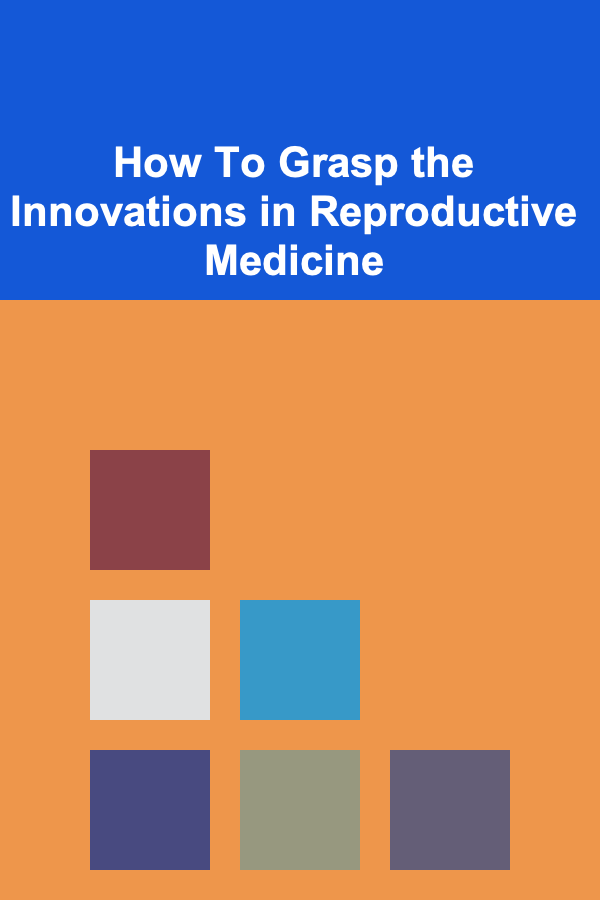
How To Grasp the Innovations in Reproductive Medicine
ebook include PDF & Audio bundle (Micro Guide)
$12.99$5.99
Limited Time Offer! Order within the next:

Reproductive medicine is a rapidly advancing field, offering new possibilities and solutions to a diverse range of challenges. From infertility to genetic diseases, the innovations emerging in reproductive medicine are reshaping how we understand and treat human reproduction. These breakthroughs are not just providing new options for individuals and couples seeking to have children, but they are also offering hope to those dealing with genetic conditions or other reproductive health issues.
In this article, we will explore the key innovations in reproductive medicine, how they work, and how they are transforming the field of reproductive healthcare. This deep dive will also cover the societal, ethical, and practical implications of these advancements, and how individuals can grasp these innovations to make informed decisions about their reproductive health.
The Evolution of Reproductive Medicine
Reproductive medicine has evolved significantly over the last few decades. Historically, the field was dominated by basic obstetrics and gynecology, with a primary focus on childbirth and pregnancy. However, as scientific understanding and technology have advanced, the scope of reproductive medicine has expanded far beyond this traditional framework.
Early Advances in Assisted Reproductive Technology (ART)
The first major breakthrough in reproductive medicine came with the development of assisted reproductive technologies (ART). In vitro fertilization (IVF), which involves fertilizing an egg outside the body and then implanting it into the uterus, revolutionized the treatment of infertility. The birth of Louise Brown, the world's first "test tube baby," in 1978 marked the beginning of IVF and set the stage for numerous innovations that followed.
As the years passed, ART techniques have improved, and new technologies have been developed to treat various forms of infertility. These include egg freezing, sperm donation, embryo screening, and even genetic editing.
Genomic Research and Precision Medicine
One of the most significant areas of growth in reproductive medicine is genomics. Advances in genetic research have provided deeper insights into the role of genetics in human reproduction, leading to new approaches for preventing and managing genetic disorders. For example, preimplantation genetic testing (PGT) allows doctors to test embryos for genetic conditions before implantation, offering couples a way to avoid passing on inherited diseases.
Furthermore, precision medicine, which tailors treatments based on an individual's genetic makeup, is starting to have a profound impact on reproductive medicine. Personalized treatment plans are being developed to optimize fertility treatments, reduce the risk of genetic diseases, and improve overall reproductive health outcomes.
Innovations in Fertility Treatments
Egg Freezing
Egg freezing is one of the most widely discussed innovations in reproductive medicine today. Initially, egg freezing was mainly used by women who were undergoing cancer treatment and needed to preserve their fertility. However, it has since become a popular choice for women who want to delay childbearing for personal or professional reasons.
In egg freezing, women's eggs are harvested, frozen, and stored for future use. When the woman is ready to conceive, the eggs can be thawed and fertilized with sperm in a laboratory setting. While this process was once considered experimental, technological advancements have made egg freezing a reliable option for preserving fertility.
In Vitro Fertilization (IVF) and its Advancements
IVF has been the cornerstone of assisted reproductive technologies since its inception. Over the years, IVF procedures have improved dramatically. One of the most significant advancements is the development of embryo culture media, which improve the chances of successful implantation.
Another groundbreaking innovation is the development of genetic screening techniques, such as preimplantation genetic testing (PGT). This technology allows doctors to screen embryos for genetic abnormalities before they are implanted in the uterus, ensuring a higher chance of a healthy pregnancy.
Furthermore, the success rates of IVF have increased with improved laboratory techniques, better embryo culture conditions, and improved embryo freezing techniques, offering hope to couples struggling with infertility.
Genetic Screening and CRISPR Technology
One of the most exciting developments in reproductive medicine is the use of genetic screening and gene editing technologies. Preimplantation genetic testing (PGT) is now a routine part of IVF, enabling doctors to test embryos for chromosomal abnormalities or inherited genetic conditions such as cystic fibrosis, Down syndrome, or Huntington's disease. This allows for the selection of the healthiest embryos before implantation.
In addition, gene editing technologies like CRISPR (Clustered Regularly Interspaced Short Palindromic Repeats) have the potential to revolutionize reproductive medicine. CRISPR allows scientists to edit specific genes within an embryo, potentially eradicating genetic diseases before they are passed on to future generations. While still in the experimental stages, this technology holds enormous promise for preventing a range of inherited conditions.
Sperm and Egg Donation
Sperm and egg donation have been critical components of reproductive medicine for decades, enabling individuals and couples facing infertility to become parents. Recent advances in the use of donor gametes have increased the success rates of ART and expanded the possibilities for those struggling with infertility.
The use of genetic testing on donor sperm and eggs ensures that they are free from genetic diseases, providing a higher chance of healthy pregnancies. Additionally, advances in cryopreservation (freezing sperm and eggs for future use) have made sperm and egg donation a more accessible option for a broader range of individuals, including single women, same-sex couples, and individuals undergoing fertility treatments.
Stem Cell Therapy and Regenerative Medicine
Another promising area of research in reproductive medicine is stem cell therapy. Stem cells have the ability to differentiate into various cell types, and their potential applications in fertility are vast. Researchers are exploring ways to use stem cells to treat infertility caused by ovarian or testicular dysfunction, by stimulating the production of eggs or sperm.
Additionally, regenerative medicine offers the possibility of repairing or replacing damaged reproductive tissues. This could lead to the restoration of fertility in individuals who have lost their reproductive function due to disease, age, or injury.
Ethical and Social Implications of Reproductive Medicine Innovations
While the advancements in reproductive medicine are undoubtedly groundbreaking, they also raise important ethical, social, and legal questions.
Ethical Concerns
One of the most contentious issues is the ethical implications of genetic screening and gene editing. Critics argue that editing the genes of embryos could lead to "designer babies," where parents might choose traits such as intelligence, appearance, or athleticism, potentially creating social inequality. The long-term effects of genetic modifications are also unknown, which raises concerns about unintended consequences.
Additionally, the use of reproductive technologies like IVF and egg freezing brings up questions about the commercialization of reproduction. The high costs associated with fertility treatments have led to concerns about accessibility, particularly for individuals and couples without the financial means to afford these technologies.
Reproductive Rights and Accessibility
The innovations in reproductive medicine have the potential to empower individuals and couples to make more informed decisions about their reproductive health. However, the accessibility of these treatments remains a significant challenge. In many parts of the world, access to fertility treatments, including IVF, egg freezing, and genetic screening, is limited by social, cultural, and financial barriers.
Governments, healthcare providers, and policymakers must work together to ensure that these advancements are accessible to a broader population. This includes making fertility treatments more affordable, addressing legal issues surrounding reproductive technologies, and creating supportive environments for individuals and families who use these services.
Social Implications
As reproductive medicine continues to advance, it is likely that the definition of family will evolve. With the rise of egg and sperm donation, as well as surrogacy, traditional notions of parenthood are being challenged. These developments raise questions about the roles of biological and social parenthood, and the rights of donors, surrogates, and intended parents.
Moreover, as more individuals and couples choose to delay childbearing or explore alternative reproductive options, the social expectations surrounding reproduction may change. This shift may challenge societal norms and lead to greater acceptance of diverse family structures.
How to Grasp the Innovations in Reproductive Medicine
Given the rapid pace of innovation in reproductive medicine, it is important to stay informed and engaged with the latest developments. Here are some practical ways to grasp these innovations:
1. Stay Updated with the Latest Research
One of the most effective ways to stay informed about advances in reproductive medicine is to follow the latest research and developments. Academic journals, medical conferences, and reputable health websites are excellent sources of information on emerging technologies and breakthroughs.
2. Consult with Reproductive Health Experts
If you are considering fertility treatments or have questions about reproductive health, consulting with a reproductive endocrinologist or fertility specialist is essential. These professionals can guide you through the options available, explain the risks and benefits, and help you make informed decisions about your reproductive health.
3. Understand the Ethical and Social Implications
It is also important to engage with the ethical and social debates surrounding reproductive medicine. Reading books, attending public discussions, and joining online forums can help you gain a deeper understanding of the implications of these technologies.
4. Consider the Accessibility and Legal Issues
When exploring reproductive options, it's crucial to consider the legal and financial aspects. Research the laws and regulations surrounding ART in your region, and be aware of the costs involved in treatments like IVF, egg freezing, or genetic screening. Additionally, understanding the insurance coverage options for fertility treatments can help ensure that you make financially responsible choices.
Conclusion
The field of reproductive medicine is experiencing an exciting period of innovation. From advancements in IVF and egg freezing to the potential of gene editing and stem cell therapy, these technologies are changing the way we approach reproduction and fertility. However, it is essential to navigate these advancements thoughtfully, taking into account the ethical, social, and legal implications of these technologies.
By staying informed and consulting with medical professionals, individuals can grasp the full potential of these innovations and make decisions that are best suited to their reproductive health and personal circumstances. Reproductive medicine is opening up new possibilities for families, and with careful consideration, these innovations can lead to better outcomes for all.
Reading More From Our Other Websites
- [Organization Tip 101] How to Create a Comfortable and Inviting Workspace
- [Personal Finance Management 101] How to Save for Retirement Even if You're Starting Late
- [Home Rental Property 101] How to Create a Rental Property Lease Agreement That Protects You
- [Personal Financial Planning 101] How to Build Emergency Savings: A Financial Planning Strategy for Unexpected Expenses
- [Organization Tip 101] How to Tackle Product Overload in Your Bathroom Cabinet
- [Organization Tip 101] How to Integrate File Organization with Your Daily Routine
- [Organization Tip 101] How to Avoid Common Plumbing Mistakes and Save Money
- [Home Staging 101] How to Stage a Kitchen to Appeal to Buyers
- [Personal Care Tips 101] How to Use a Facial Scrub for Clearer Skin
- [Home Maintenance 101] How to Clean a Microwave: Easy Methods for a Spotless Appliance

Effective Strategies for Facilities Managers: Optimizing Space and Resources
Read More
How to Reduce Pet Odors in Your Home
Read More
How to Store Seasonal Decor Without Taking Up Too Much Space
Read More
How to Track Your Spending for Better Financial Awareness
Read More
How to Understand the Psychology of Dreams
Read More
How to Track Fixed Expenses When Living on a Tight Budget
Read MoreOther Products

Effective Strategies for Facilities Managers: Optimizing Space and Resources
Read More
How to Reduce Pet Odors in Your Home
Read More
How to Store Seasonal Decor Without Taking Up Too Much Space
Read More
How to Track Your Spending for Better Financial Awareness
Read More
How to Understand the Psychology of Dreams
Read More